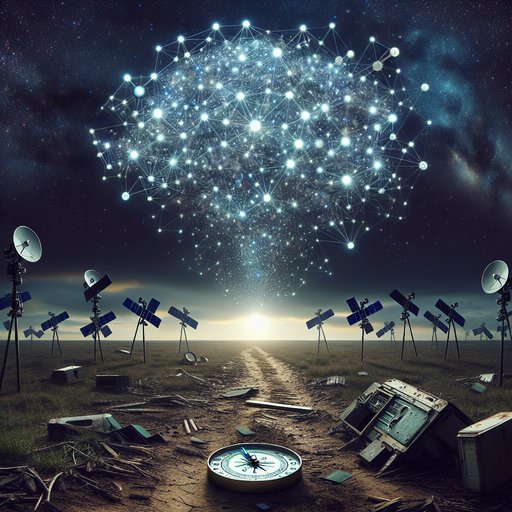
In a world increasingly reliant on artificial intelligence, the cracks in the facade are becoming harder to ignore. Businesses initially dazzled by the promise of AI's efficiency and cost-cutting potential are now grappling with unforeseen consequences. From costly errors to cultural faux pas, the reliance on AI is proving to be a double-edged sword, much like the satellites cluttering our night skies that were meant to connect us but now obscure our view of the stars. Just as the night sky was once a compass and a canvas for human imagination, AI was heralded as the next frontier. Yet, as we hurtle into this new era, it's worth questioning whether we are losing our way.
Anthropologically speaking, technological advancements often mirror our species' compulsion to tame and manipulate our environment. The rapid integration of AI into business operations echoes humanity's historical drive to conquer new frontiers, analogous to our celestial endeavors. We once looked to the stars not only for navigation but for inspiration, as their patterns dictated seasons and mythology. But AI, like the satellites increasingly polluting the night sky, risks obstructing the natural brilliance it promised to illuminate.
Companies across industries have turned to AI as a panacea for labor costs, only to find that the technology's imperfections can be as problematic as the issues it aims to solve. A notable example involved a company forced to pay a significant sum to rectify AI-induced errors, highlighting that human oversight remains indispensable [1]. This scenario is reminiscent of our initial forays into space exploration, where the unbridled enthusiasm to launch technologies into orbit has resulted in a cluttered and chaotic sky. The revelation that indie rock sensation, The Velvet Sundown, is entirely AI-generated shocked fans and highlighted the thin line between novelty and deception [2][3][4].
This band, much like the artificial constellations of satellites overhead, poses existential questions about authenticity and creativity in the digital age. Just as cultures once crafted stories and songs inspired by the heavens, the music industry now faces the challenge of distinguishing human artistry from algorithmic output. AI's infiltration into creative domains has not gone unnoticed by cultural gatekeepers. A famous horror director has openly criticized AI's encroachment, fearing that it will sap the soul from storytelling [5].
This echoes concerns about satellite interference, which threatens to blur the once-clear boundaries of our cosmic understanding. As with celestial navigation, the arts serve as vital cultural compasses, and their integrity is worth safeguarding against indiscriminate technological disruption. Business reliance on AI has also raised ethical concerns, much like the need for global governance over shared spaces such as the Antarctic and the cosmos. The market's unchecked expansion into AI reflects humanity's tendency to exploit new territories without considering long-term consequences.
As treaties once protected Antarctica for science, so too must we develop frameworks that govern AI ethically and sustainably. The concept of the night sky as a cultural heritage offers a compelling parallel to how businesses might rethink their approach to AI. Instead of viewing AI as an infinite frontier, companies might consider it a shared resource that must be managed collectively and responsibly. Reframing AI from a tool of domination to one of stewardship could alleviate some of the current tensions and frustrations businesses face as they adjust to the realities of AI integration.
Ultimately, there is hope for a balanced relationship between humanity and AI. By adopting a more holistic perspective—one that values human input alongside technological innovation—we can ensure that AI serves as a partner rather than a replacement. Just as renewed efforts aim to declutter our skies and preserve our view of the stars, so too can businesses learn to navigate AI's potential pitfalls with wisdom and foresight, keeping our cultural beacons intact for future generations.
Sources
- Company Turns To AI For Cost Cutting, Ends Up Paying US Woman Rs 1.7 Lakh To Fix Errors (Ndtvprofit.com, 2025-07-08T04:35:43Z)
- 'We're AI,' Popular Indie Rock Band Admits (International Business Times, 2025-07-08T18:21:06Z)
- AI Band Shocks the World : The Velvet Sundown’s Viral Rise (Geeky Gadgets, 2025-07-08T10:47:59Z)
- New Viral Indie Rock Sensation Reveals They're 100% AI (ScienceAlert, 2025-07-09T03:14:58Z)
- A Fan-Favorite Horror Director Takes a Stance Against AI (ComicBook.com, 2025-07-04T09:28:00Z)























































